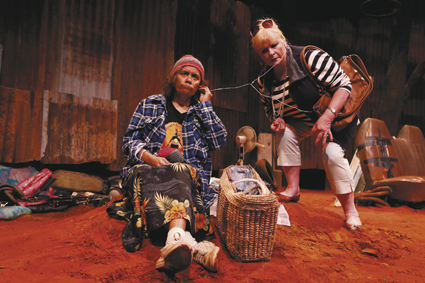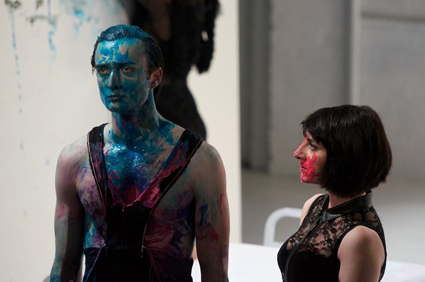 |
Head Full of Love, QTC photo Rob McColl |
The QTC production of Alana Valentine’s Head Full of Love focuses on an unlikely friendship between two women: a white suburban housewife from Sydney and an Indigenous Elder from a remote community in the Northern Territory. The Danger Ensemble’s new work, Loco Maricon Amor, deconstructs the unconsummated and passionate friendship between playwright Federico García Lorca and painter Salvador Dalí.
Valentine is Australia’s premiere verbatim theatre playwright and Head Full of Love is a result of years of consultation with community in Central Australia, including the Purple House, a community renal dialysis unit, the Alice Springs Beanie Festival and the Ngaanyatjarra Pitjantjatjara Yankunytjatjara (NPY) Women’s Council. The work debuted at the Darwin Festival and has been revived as part of QTC’s transformation under Artistic Director Wesley Enoch.
Enoch’s gift to Australian theatre has been the creation of personal stories that seek to heal the seemingly intractable grief and shame that lie between black and white Australia. Head Full of Love has all of his trademark warmth and sense of pathos. Roxanne McDonald as Tilly and Collette Mann as Nessa are both irresistibly charming. Valentine deftly navigates cross-cultural clichés. Nessa moves from white anxiety, “Do I start with sorry,” and Tilly from black cynicism, “Are you a missionary, a mercenary or a misfit?” to a shared realisation that they are both disconnected from their families and exiled from their homes.
Although Head Full of Love is based on the interviews undertaken during creative development, the form is a gentle magic realism. The play slides from naturalism into a fantastical world, climaxing with a ritualistic presentation of knitted beanies placed reverentially on hip-high hat stands. The play closes with the death of Tilly, who entreats Nessa to take her identity and her family responsibilities in order to avoid her son returning her to psychiatric care. That this awkward plot device works is a tribute to the power of the production, as Head Full of Love left me with a sense of hope and continuity that lingered for days.
 |
Loco Maricon Amor, The Danger Ensemble photo Morgan Roberts |
The putative sexual relationship between Lorca and Dalí has been a zeitgeist fetish since the Paul Morrison film Little Ashes in 2008. In Loco Maricon Amor an old and very ill Dalí taunts a plaintive young woman, recounting and re-enacting key moments of his relationship with his wife and muse Gala and the martyred playwright Lorca. The young woman is the moon, an observer of love and a witness to the unfolding disintegration of human passion, sex and emotion onstage.
Every detail of the piece is sharply planned, from the white pop art set to the cane with its rectangular gold hilt brandished by Gala. The encounters between the historical figures are interspersed with interrogations led by a chorus of three singers, belting out deconstructed standards from Doris Day to Beyoncé that lift the energy of the show into rock concert explosiveness.
The structure of the work is self-consciously circular with sequences that recycle and re-set, cribbed from the correspondence between Dalí and Lorca, symbols from surrealist art and Lorca’s theatrical masterworks. What drives the piece is the passionate intensity of the performers, who are brave and extraordinary. Every surface of their bodies is stripped, painted and exposed and they hold nothing back.
Loco Maricon Amor reads best as a choreographic poem, but it suffers from the ambition of its manifesto. Like the girl with the curl on her forehead, when it is good, it is really, really good. But, one awkward composition, one too many repetitions and the audience steps out of the pulsating action and the show is revealed to be merely a chorus of actors painting themselves and a white set with neon splashes of colour.
There are attempts to lighten the mood and pace through the personable character of the moon and short sequences that are replayed, mocking the intensity of the show, but they are not quite sufficient to leaven the earnestness. I have no doubt that the next iteration of the work will be tighter and more balanced. Experiencing Mitchell Wright’s obsessive mashing aesthetic is like eating too much chocolate in one sitting, an addictive overload, but one that always leaves you wanting more.
Queensland Theatre Company, Head Full of Love, writer Alana Valentine, director Wesley Enoch, performers Collette Man, Roxanne McDonald, designer Simone Romaniuk, lighting Ben Hughes, composer, sound Brett Collery; Cremorne Theatre, QPAC, Brisbane, July 7-Aug 11; The Danger Ensemble, Loco Maricon Amor, director, designer Steven Mitchell Wright, performers, co-devisors Chris Beckey, Caroline Dunphy, Thomas Hutchins, Lucy-Ann Langkilde, Polly Sara, Peta Ward, Bianca Zouppas, dramaturg Chris Beckey, lighting Ben Hughes, strings Lyndon Chester, co-designer Xani Kennedy, co-presented with Metro Arts; Sue Benner Theatre, Metro Arts, Brisbane, Aug 17-Sept 1
Kathryn Kelly is a freelance dramaturg based in Brisbane and a PhD candidate at the University of Queensland.
RealTime issue #111 Oct-Nov 2012 pg. 41
© Kathryn Kelly; for permission to reproduce apply to [email protected]








 back
back